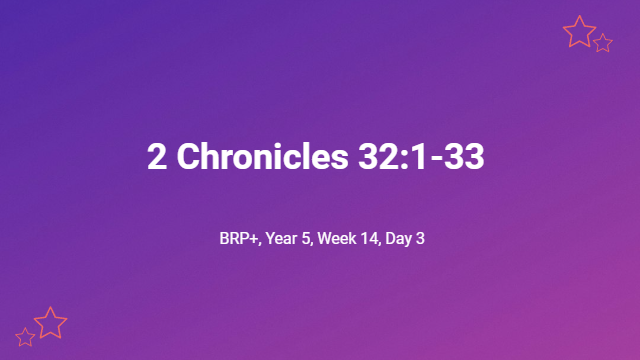2 Chronicles 32:1-33
Q.1. Are our trials punishment from God? Did Hezekiah rely upon his defence measures to defend Judah against the Assyrians? How did Sennacherib undermine Hezekiah? How did he support his claims? – (2 Chr.32:1-19)
Hezekiah and the people had been responsive and faithful to God – After these acts of faithfulness Sennacherib king of Assyria came and invaded Judah and besieged the fortified cities and thought to break into them for himself (2 Chr.32:1). Trials are not necessarily sent to punish us. In fact, these trials would give Judah and her king a further opportunity to trust in God. When Hezekiah heard of the threat, he took a number of measures to frustrate Sennacherib’s plans. They blocked the water supply to the invading army, erected defence towers, and increased the weapons of warfare (2 Chr.32:2-6). However, Hezekiah trusted in none of these things, but pointed his people to their ultimate Defender – 7 “Be strong and courageous, do not fear or be dismayed because of the king of Assyria nor because of all the horde that is with him; for the one with us is greater than the one with him. 8 With him is only an arm of flesh, but with us is the Lord our God to help us and to fight our battles.” (2 Chr.32:7-8). Sennacherib didn’t consider Judah could give serious resistance. He sent some of his generals to demoralize the soldiers. They accused Hezekiah of misleading the people (2 Chr.32:10-11). No nation had been able to match the power of the Assyrian army and their gods (2 Chr.32:13-18). They maligned Hezekiah for centralizing the worship of Israel at Jerusalem, as God had commanded (2 Chr.32:12). However, in their arrogance, they made the mistake of insulting the living God (2 Chr.32:17-19).
Q.2. How did Hezekiah respond to the insults of the Assyrians? What made this a game-changer? How did the people respond to Hezekiah’s godly leadership? – (2 Chr.32:20-23 c.f. Is.37:14-38)
Hezekiah acknowledged that their army and defences were no match for the Assyrians. He entered the house of the Lord and sent for Isaiah, the prophet, and they cried out to God (2 Kgs. 19:1-3; Is.37:1-3). Hezekiah confirmed the strength of his reliance upon God – 14 Then Hezekiah took the letter from the hand of the messengers and read it, and he went up to the house of the Lord and spread it out before the Lord. 15 Hezekiah prayed to the Lord saying, 16 “O Lord of hosts, the God of Israel, who is enthroned above the cherubim, You are the God, You alone, of all the kingdoms of the earth. You have made heaven and earth (Is.37:14-16). The divine response was immediate and devastating – the Lord sent an angel who destroyed every mighty warrior, commander, and officer in the camp of the king of Assyria. So he returned in shame to his own land. And when he had entered the temple of his god, some of his own children killed him there with the sword (2 Chr.32:21). The people acknowledged the godly leadership of Hezekiah with generous gifts – … so that he was exalted in the sight of all nations thereafter (2 Chr.32:23). This story was so noteworthy that it was recorded in triplicate in 2 Kgs.18:13-20:21; 2 Chr.32:1-33; Is.36:1-39:8).
Q.3. What was Hezekiah’s undoing late in life? Why was Hezekiah afflicted? Did the king turn from his foolishness? What kind of a man was Hezekiah? – (2 Chr.32:24-33 c.f. Is.38:1-22; 39:1-8)
Later in life Isaiah was sent to Hezekiah who was mortally ill – Thus says the Lord, Set your house in order, for you shall die and not live (Is.38:1). Hezekiah wept bitterly and pleaded with God to reward his faithfulness and let him live. God then instructed Isaiah to return to Hezekiah and inform him that God would give him 15 more years. He would give a sign. The sun dial would go back ten steps, as proof of His promise to restore him from his deathbed (2 Chr.32:24 c.f. Is.38:2-8, 21). However, this miraculous healing went to Hezekiah’s head, and became his undoing. He entertained some Babylonian envoys and boasted on his wealth … for which he was rebuked by God (2 Chr.32:25 c.f. Is.39:1-8). God actually extended His healing hand on Hezekiah and sent envoys to test him – Even in the matter of the envoys of the rulers of Babylon, who sent to him to inquire of the wonder that had happened in the land, God left him alone only to test him, that He might know all that was in his heart (2 Chr.32:31). The writer told us that the king did respond positively to Isaiah – However, Hezekiah humbled the pride of his heart, both he and the inhabitants of Jerusalem, so that the wrath of the Lord did not come on them in the days of Hezekiah (2 Chr.32:26). God gave Hezekiah great wealth (2 Chr.32:27-29). Hezekiah was an outstanding leader. His devotion and godly leadership were recorded in three books of the Bible. His love for God was written in song form, to be remembered to this very day (Is.37:14-20; 38:9-20).

